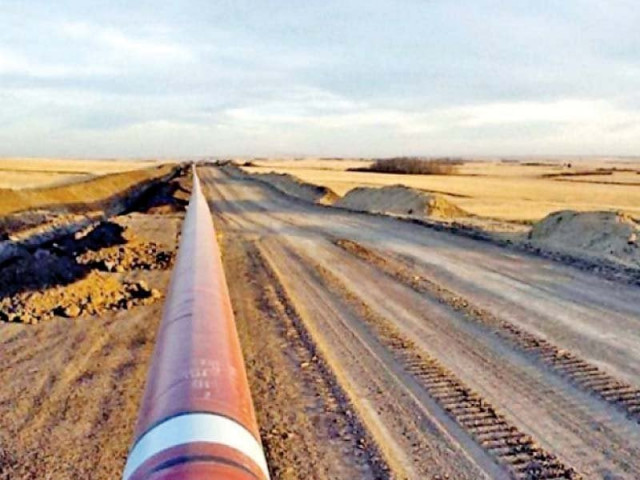GDS target likely to be slashed for next year
Collection is expected to be Rs29.9b, which is 35% lower than this year.

In the two years of the current government, gas production has gone up by 500 million cubic feet per day (mmcfd), but the same quantity has been lost due to depletion of existing reserves. PHOTO: FILE
The government is likely to set the target of gas development surcharge (GDS) collection at Rs29.9 billion in the upcoming budget for 2015-16, which is 35.5% lower than the projection for the current financial year.
The estimate of GDS collection was Rs46.4 billion this year, but it is likely to be missed in the wake of delay in announcing revised prices of gas determined by the Oil and Gas Regulatory Authority (Ogra).
“GDS is the difference between prescribed price and selling price of gas and this revenue goes to provinces according to their share in gas production,” said an official familiar with the development.
He pointed out that the government had failed to notify increase in gas prices for the last two and a half years and that also affected the receipt of GDS.
In the total gas production, the share of Sindh is around 70% and it will receive most of the GDS. Of the expected GDS collection of Rs29.9 billion in the upcoming fiscal year, estimates suggest Rs17.67 billion will go to Sindh, Balochistan will get Rs6.51 billion, Khyber-Pakhtunkhwa will receive Rs3.630 billion and Punjab will get Rs2.18 billion.
Apart from the delay in notifying revised gas prices, no significant rise in gas production has been recorded as it is standing at 4 billion cubic feet per day (bcfd) for the last several years.
In the two years of the current government, gas production has gone up by 500 million cubic feet per day (mmcfd), but the same quantity has been lost due to depletion of existing reserves.
With fears of political backlash in mind, the government is reluctant to revise the gas tariff upwards despite the determination of new rates by Ogra for the ongoing financial year.
It was required to notify the increase in prices from January 1 this year, but the prime minister put off the announcement until April. However, in April again, it could not make the announcement.
The other thing that caused the delay in increasing the gas tariffs was the government’s desire to implement policy guidelines for the regulator in an attempt to pass the burden of Rs49 billion on to consumers.
The amount was collected by and stuck with gas transmission and distribution companies after courts issued stay orders in cases filed against the increase in benchmark ceiling for gas theft and leakage, called unaccounted-for-gas, in 2010 by Ogra headed by then chairman Tauqeer Sadiq.
Other decisions on gas prices taken by the federal government have upset the provinces. Sindh and Balochistan have strongly protested over abolition of the gas pricing formula for Mari Petroleum Company, saying their revenue from gas production has dropped 50%.
The two provinces argue that revocation of the gas price agreement with Mari Petroleum Company has resulted in a huge loss in GDS receipts and reduced their share by around 50%. They stress that GDS is a provincial revenue source and any decline in its receipt will adversely affect their cash balance.
“This may be the reason why the government is setting a low target for GDS collection,” the official remarked.
Published in The Express Tribune, June 2nd, 2015.
Like Business on Facebook, follow @TribuneBiz on Twitter to stay informed and join in the conversation.



















COMMENTS
Comments are moderated and generally will be posted if they are on-topic and not abusive.
For more information, please see our Comments FAQ